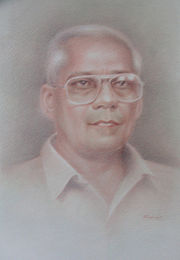Galp-Bhuban [A World of Stories]
09/05/2009 18:13Galp-Bhuban [A World of Stories]
Abdur Rouf Choudhury brought the subject matter of the story down to an everyday level which shocked readers at the time - and can still do so now. He also began to downgrade the element of plot and suspense in favour of character disclosure.
His stories excel at atmosphere. While much has been made of the fact that the stories are not exactly elevating, upon reading the collection of 10 masterfully written stories, one will feel as though they have caught a glance of something, an experience, perhaps, of something totally out of their comfort zone. These stories are about dislocation in both the traditional sense of the uneasy feeling peculiar to all migrants, but also in a metaphorical sense: that there is more wrong, than right with certain lives, wherever one may find himself or herself. These stories are written as one might paint a picture; the images are downright, sad. Satisfactory upshot is sometimes way off the mark, but more often just slightly out of reach.
Choudhury's radiant writing reveals characters whose experiences are universal. The further away they are from their home country and the more they find out about themselves, the more heart-rending the stories become. These stories are often a sad portrait of those in search of a better life, wherever that might be, filled with the sense that things are exponentially more difficult in a country not your own, made even more so by the extreme desire to belong, or, in some cases, merely get by.
In the story Neela, Ahmed had a happy life with his wife Neela, he does a job which is similar to many immigrants, while trying to cobble together a life of his own. When he makes small steps toward setting boundaries between his friends and his family life, a tragedy ensues. One can feel the claustrophobic atmosphere that Ahmed goes through every day, a life that puzzles his prosperous friends from the old country, as well. This story depicts the relationship between Neela and Ahmed.
In the story Rani, a friend encounters the meeting of his married friend. While he cringes at the limitations his friend’s wife has set on her own existence at such a young age, and is suspicious at the man she has yoked herself to, he knows why she has invited him, but gives her every opportunity to redeem herself. While the reader may correctly anticipate the ending, the feeling it leaves is one that most will relate to: to vow always to avoid having to stop so low.
On the train to Karaci Nasim is quiet, watching the outside world. He glances around at the commuters, soldiers lying on the branch with their bags under their heads watching other female commuters. He turns back to the two-toned world outside the window, and his eyes follow the traffic on the motorway that narrows with the tracks, then angles away sharply into the engulfing wilderness. He finds little to see out here besides the beige cubes of buildings, stations walls defaced with graffiti, a row of houses bafflingly painted white. These are the back doors of towns, their ugliest parts, Nasim thinks. He is ashamed that this is what Karaci must see first.
Choudhury’s characters suffer in a variety of ways. No matter which environment the stories are situated in and irrespective of whether they have just arrived in their new land or to the original home, they do so with the smallest bit of hope. The title itself, Galp-Bhuban [A World of Stories], gives testament to that. In the end, perhaps they obey, unknowingly: We are where we think we are. Neither time nor distance makes any difference.
———
Back
